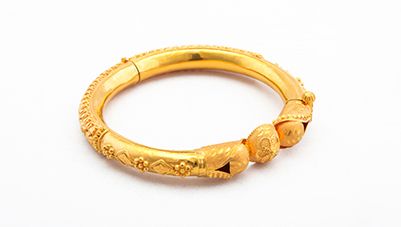Rs. 5,000 - Rs. 2 crore
To find the nearest gold loan branch,
Enter phone and OTP | Check amount you can get | Apply for quick funds
What is digital gold?
Gold has always been seen as a sign of wealth and financial safety. However, its price often changes due to several factors like global demand, inflation, and currency value. When gold prices rise, it affects both economies and investors in different ways. For investors, it can mean better returns and a secure investment option during uncertain times. For economies, higher gold prices can impact imports, exports, and overall financial stability. Understanding what causes these price changes helps both individuals and markets make smarter financial decisions and stay prepared for shifting economic conditions.
What are gold ETFs?
Gold Exchange Traded Funds (ETFs) are financial instruments that track the price of physical gold. These are traded on stock exchanges like shares, making them accessible to investors with a demat account. Gold ETFs represent ownership in gold, and each unit corresponds to a specific quantity of physical gold. ETFs provide liquidity as they can be easily bought and sold on the market. They offer transparency, as their prices are linked to the current gold rates, making them an attractive option for investors seeking exposure to gold without owning it physically.
Difference between digital gold and gold ETFs
| Feature | Digital Gold | Gold ETFs |
| Storage | Stored in digital form by providers | Held in a demat account |
| Trading Hours | Can be bought/sold 24/7 | Traded only during stock market hours |
| Minimum Investment | Low (as low as Re. 1) | Requires a minimum ETF unit purchase |
| Fees and Charges | May involve storage fees | Includes brokerage and fund management fees |
| Liquidity | High, can be sold at any time | High, but limited to market hours |
Should you invest in digital gold or gold ETFs?
Choosing between digital gold and Gold ETFs depends on your investment goals. Digital gold suits small investors looking for flexibility in purchasing smaller amounts and easy liquidity at any time. On the other hand, Gold ETFs are suitable for investors who already have a demat account and want to trade in gold like shares during market hours. Both options offer exposure to gold without physical storage, but Gold ETFs provide more transparency and lower charges for larger investments. Assess your financial objectives before making a decision.
Pros and cons of digital gold vs. gold ETFs
Investing in digital gold or Gold ETFs offers different benefits and drawbacks:
| Feature | Digital Gold | Gold ETFs |
| Ownership | Direct ownership of physical gold, redeemable for coins or bars. | No physical ownership; you own shares representing gold. |
| Fees | May involve storage fees over time. | Lower management fees, but may incur brokerage costs. |
| Liquidity | Instant transactions through apps with high liquidity. | Traded on exchanges, highly liquid but may incur fees. |
| Diversification | Mainly focuses on physical gold investment. | Easy to integrate into a diversified portfolio. |
This table outlines the core advantages and disadvantages of both investment options in a clear, comparative format.
Pro tip: Discover your borrowing potential by checking your gold loan eligibility. It takes just a few clicks and no waiting.
How to choose between digital gold and gold ETFs?
Before choosing between digital gold and Gold ETFs, consider your investment preferences. If you want flexibility with small investments and liquidity at any time, digital gold is ideal. However, if you already have a demat account and prefer trading in a regulated market, Gold ETFs may be better suited. You should also evaluate fees, storage charges, and the ease of selling when making your decision. Think about the purpose of your investment and your risk tolerance before committing to either option.
Tax implications of digital gold vs. gold ETFs
The tax treatment of digital gold and Gold ETFs differs. Gains from digital gold are subject to capital gains tax based on the holding period, similar to physical gold. Short-term gains are taxed according to your income tax slab, while long-term gains are taxed at 20% with indexation benefits. For Gold ETFs, short-term capital gains are taxed at your income slab rate, while long-term gains also attract 20% tax with indexation. Additionally, there may be GST charges on digital gold purchases, which don’t apply to ETFs.
Can you use gold ETFs as collateral for a gold loan?
Yes, you can use Gold ETFs as collateral for a gold loan. Financial institutions allow you to pledge your Gold ETFs to secure loans, similar to how you can pledge physical gold. The loan amount depends on the value of the ETF units, and the process is simple if you already have an ETF account. Since Gold ETFs represent actual gold holdings, they offer a reliable source of collateral for gold loans.
How to apply for a gold loan with digital gold or gold ETFs?
Applying for a gold loan with digital gold or Gold ETFs follows a straightforward process. For digital gold, some providers allow you to pledge your holdings to secure a loan. With Gold ETFs, you can approach financial institutions that accept ETFs as collateral. You'll need to submit your ETF account details or digital gold certificates, and the loan is sanctioned based on the value of your holdings. Interest rates vary, and it's important to compare lenders before applying.
Quick tip: Have idle gold lying at home? Turn it into instant funds with a Bajaj Finserv Gold Loan today! Apply now
Is a gold loan possible against digital gold?
Yes, you can secure a gold loan against digital gold. Some financial institutions and digital gold platforms offer this service. You can pledge your digital gold holdings and receive a loan based on their value. The process is similar to pledging physical gold or Gold ETFs. However, the loan amount depends on the current market price of gold. The gold loan tenure and interest rates may vary, so it's crucial to review your options before applying.
Eligibility of digital gold loan gold ETFs
The eligibility for securing a loan against digital gold or Gold ETFs depends on the lender's terms. Generally, any individual holding digital gold or Gold ETFs can apply for a loan. For digital gold, you may need to hold a minimum quantity before it can be pledged. For Gold ETFs, the process is more straightforward if you already have an ETF account. Lenders assess the value of your gold holdings before approving the loan, and interest rates and tenure may vary.
Related Articles
Disclaimer
Bajaj Finance Limited has the sole and absolute discretion, without assigning any reason to accept or reject any application. Terms and conditions apply*.
For customer support, call Personal Loan IVR: 7757 000 000














 Personal Loan
Personal Loan Check Eligibility
Check Eligibility Salaried Personal Loan
Salaried Personal Loan EMI Calculator
EMI Calculator Account Aggregator
Account Aggregator
 Deals starting @99
Deals starting @99 Min. 50% off
Min. 50% off
 Bajaj Pay
Bajaj Pay Wallet to Bank
Wallet to Bank
 Smartphones
Smartphones Led TVs
Led TVs Air Conditioner
Air Conditioner Refrigerators
Refrigerators Air Coolers
Air Coolers Laptops
Laptops Washing Machines
Washing Machines Savings Offer
Savings Offer Easy EMI Loan
Easy EMI Loan
 Loan Against Shares
Loan Against Shares Loan Against Mutual Funds
Loan Against Mutual Funds Loan Against Insurance Policy
Loan Against Insurance Policy ESOP Financing
ESOP Financing Easy EMI Loan
Easy EMI Loan Two-wheeler Loan
Two-wheeler Loan Loan for Lawyer
Loan for Lawyer Industrial Equipment Finance
Industrial Equipment Finance Industrial Equipment Balance Transfer
Industrial Equipment Balance Transfer Industrial Equipment Refinance
Industrial Equipment Refinance Personal Loan Branch Locator
Personal Loan Branch Locator Used Tractor Loan
Used Tractor Loan Loan Against Tractor
Loan Against Tractor Tractor Loan Balance Transfer
Tractor Loan Balance Transfer Flexi
Flexi View All
View All
 Two-wheeler Loan
Two-wheeler Loan Bike
Bike Commuter Bike
Commuter Bike Sports Bike
Sports Bike Tourer Bike
Tourer Bike Cruiser Bike
Cruiser Bike Adventure Bike
Adventure Bike Scooter
Scooter Electric Vehicle
Electric Vehicle Best Sellers
Best Sellers Popular Brands
Popular Brands

 Open Demat Account
Open Demat Account Trading Account
Trading Account Margin Trading Facility
Margin Trading Facility Share Market
Share Market Invest in IPO
Invest in IPO All stocks
All stocks Top gainers
Top gainers Top losers
Top losers 52 week high
52 week high 52 week low
52 week low Loan against shares
Loan against shares
 Home Loan
Home Loan Transfer your existing Home loan
Transfer your existing Home loan Loan against Property
Loan against Property Home Loan for Salaried
Home Loan for Salaried Home loan for self employed
Home loan for self employed Loan Against Property Balance Transfer
Loan Against Property Balance Transfer Home Loan EMI Calculator
Home Loan EMI Calculator Home Loan eligibility calculator
Home Loan eligibility calculator Home Loan balance transfer
Home Loan balance transfer View All
View All
 Term Life Insurance
Term Life Insurance ULIP Plan
ULIP Plan Savings Plan
Savings Plan Family Insurance
Family Insurance Senior Citizen Health Insurance
Senior Citizen Health Insurance Critical Illness Insurance
Critical Illness Insurance Child Health Insurance
Child Health Insurance Pregnancy and Maternity Health Insurance
Pregnancy and Maternity Health Insurance Individual Health Insurance
Individual Health Insurance Low Income Health Insurance
Low Income Health Insurance Student Health Insurance
Student Health Insurance Group Health Insurance
Group Health Insurance Retirement Plans
Retirement Plans Child Plans
Child Plans Investment Plans
Investment Plans
 Business Loan
Business Loan Secured Business Loan
Secured Business Loan Loan against property
Loan against property Loans against property balance transfer
Loans against property balance transfer Loan against shares
Loan against shares Home Loan
Home Loan Loans against mutual funds
Loans against mutual funds Loan against bonds
Loan against bonds Loan against insurance policy
Loan against insurance policy
 Apply for Gold Loan
Apply for Gold Loan Transfer your Gold Loan with Us
Transfer your Gold Loan with Us Gold Loan Branch Locator
Gold Loan Branch Locator
 ULIP Plan
ULIP Plan Savings Plan
Savings Plan Retirement Plans
Retirement Plans Child Plans
Child Plans Free Demat Account
Free Demat Account Invest in Stocks
Invest in Stocks Invest in IPO
Invest in IPO Margin Trading Facility
Margin Trading Facility Fixed Deposit Branch Locator
Fixed Deposit Branch Locator
 New Car Loan
New Car Loan Used Car Loan
Used Car Loan Loan Against Car
Loan Against Car Car Loan Balance Transfer and Top-up
Car Loan Balance Transfer and Top-up My Garage
My Garage
 Get Bajaj Prime
Get Bajaj Prime
 Mobiles on EMI
Mobiles on EMI Electronics on EMI Offer
Electronics on EMI Offer  Iphone on EMI
Iphone on EMI LED TV on EMI
LED TV on EMI Refrigerator on EMI
Refrigerator on EMI Laptop on EMI
Laptop on EMI Kitchen appliances on EMI
Kitchen appliances on EMI Washing machines
Washing machines
 Personal Loan EMI Calculator
Personal Loan EMI Calculator Personal Loan Eligibility Calculator
Personal Loan Eligibility Calculator Home Loan EMI Calculator
Home Loan EMI Calculator Home Loan Eligibility Calculator
Home Loan Eligibility Calculator Good & Service Tax (GST) Calculator
Good & Service Tax (GST) Calculator Flexi Day Wise Interest Calculator
Flexi Day Wise Interest Calculator Flexi Transaction Calculator
Flexi Transaction Calculator Secured Business Loan Eligibility Calculator
Secured Business Loan Eligibility Calculator Fixed Deposits Interest Calculator
Fixed Deposits Interest Calculator Two wheeler Loan EMI Calculator
Two wheeler Loan EMI Calculator New Car Loan EMI Calculator
New Car Loan EMI Calculator Used Car Loan EMI Calculator
Used Car Loan EMI Calculator All Calculator
All Calculator Used Tractor Loan EMI Calculator
Used Tractor Loan EMI Calculator
 Hot Deals
Hot Deals Clearance Sale
Clearance Sale Kitchen Appliances
Kitchen Appliances Tyres
Tyres Camera & Accessories
Camera & Accessories Mattresses
Mattresses Furniture
Furniture Watches
Watches Music & Audio
Music & Audio Cycles
Cycles Mixer & Grinder
Mixer & Grinder Luggage & Travel
Luggage & Travel Fitness Equipment
Fitness Equipment Fans
Fans
 Personal Loan for Doctors
Personal Loan for Doctors Business loan for Doctors
Business loan for Doctors Home Loan
Home Loan Secured Business Loan
Secured Business Loan Loan against property
Loan against property Secured Business Loan Balance Transfer
Secured Business Loan Balance Transfer Loan against share
Loan against share Gold Loan
Gold Loan Medical Equipment Finance
Medical Equipment Finance
 Smart Hub
Smart Hub ITR Service
ITR Service Digi Sarkar
Digi Sarkar
 Savings Offer
Savings Offer Easy EMI
Easy EMI Offer World
Offer World 1 EMI OFF
1 EMI OFF New Launches
New Launches Zero Down Payment
Zero Down Payment Clearance Sale
Clearance Sale Bajaj Mall Sale
Bajaj Mall Sale
 Mobiles under ₹20,000
Mobiles under ₹20,000 Mobiles under ₹25,000
Mobiles under ₹25,000 Mobiles under ₹30,000
Mobiles under ₹30,000 Mobiles under ₹35,000
Mobiles under ₹35,000 Mobiles under ₹40,000
Mobiles under ₹40,000 Mobiles under ₹50,000
Mobiles under ₹50,000
 Articles
Articles
 Overdue Payments
Overdue Payments Other Payments
Other Payments
 Document Center
Document Center Bank details & Documents
Bank details & Documents Tax Invoice Certificate
Tax Invoice Certificate
 Do Not Call Service
Do Not Call Service
 Hamara Mall Orders
Hamara Mall Orders Your Orders
Your Orders

 Fixed Deposit (IFA) Partner
Fixed Deposit (IFA) Partner Loan (DSA) Partner
Loan (DSA) Partner Debt Management Partner
Debt Management Partner EMI Network Partner
EMI Network Partner Became a Merchant
Became a Merchant Partner Sign-in
Partner Sign-in
 Trade directly with your Demat A/c
Trade directly with your Demat A/c ITR
ITR My Garage
My Garage
 Live Videos - Beta
Live Videos - Beta
 Savings Offer
Savings Offer Smartphones
Smartphones LED TVs
LED TVs Air Conditioners
Air Conditioners Refrigerators
Refrigerators Air Coolers
Air Coolers Laptops
Laptops Washing Machines
Washing Machines Water Purifiers
Water Purifiers Tablets
Tablets Kitchen Appliances
Kitchen Appliances Mattresses
Mattresses Furniture
Furniture Music and Audio
Music and Audio Cameras & Accessories
Cameras & Accessories Cycle
Cycle Watches
Watches Tyres
Tyres Luggage & Travel
Luggage & Travel Fitness Equipment
Fitness Equipment Tractor
Tractor Easy EMI Loan
Easy EMI Loan
 vivo Mobiles
vivo Mobiles OPPO Mobiles
OPPO Mobiles Xiaomi Mobiles
Xiaomi Mobiles Sony LED TVs
Sony LED TVs Samsung LED TVs
Samsung LED TVs LG LED TVs
LG LED TVs Haier LED TVs
Haier LED TVs Godrej Refrigerators
Godrej Refrigerators Voltas Washing Machines
Voltas Washing Machines
 New Tractor Loan
New Tractor Loan Used Tractor Loan
Used Tractor Loan Loan Against Tractor
Loan Against Tractor Tractor Loan Balance Transfer
Tractor Loan Balance Transfer
 New Car Loan
New Car Loan New Cars Under ₹10 Lakh
New Cars Under ₹10 Lakh New Cars – ₹10–₹15 Lakh
New Cars – ₹10–₹15 Lakh New Cars – ₹15–₹20 Lakh
New Cars – ₹15–₹20 Lakh New Cars – ₹20–₹25 Lakh
New Cars – ₹20–₹25 Lakh New Car Brands
New Car Brands Petrol – New Cars
Petrol – New Cars Diesel – New Cars
Diesel – New Cars Electric – New Cars
Electric – New Cars CNG – New Cars
CNG – New Cars Hybrid – New Cars
Hybrid – New Cars









